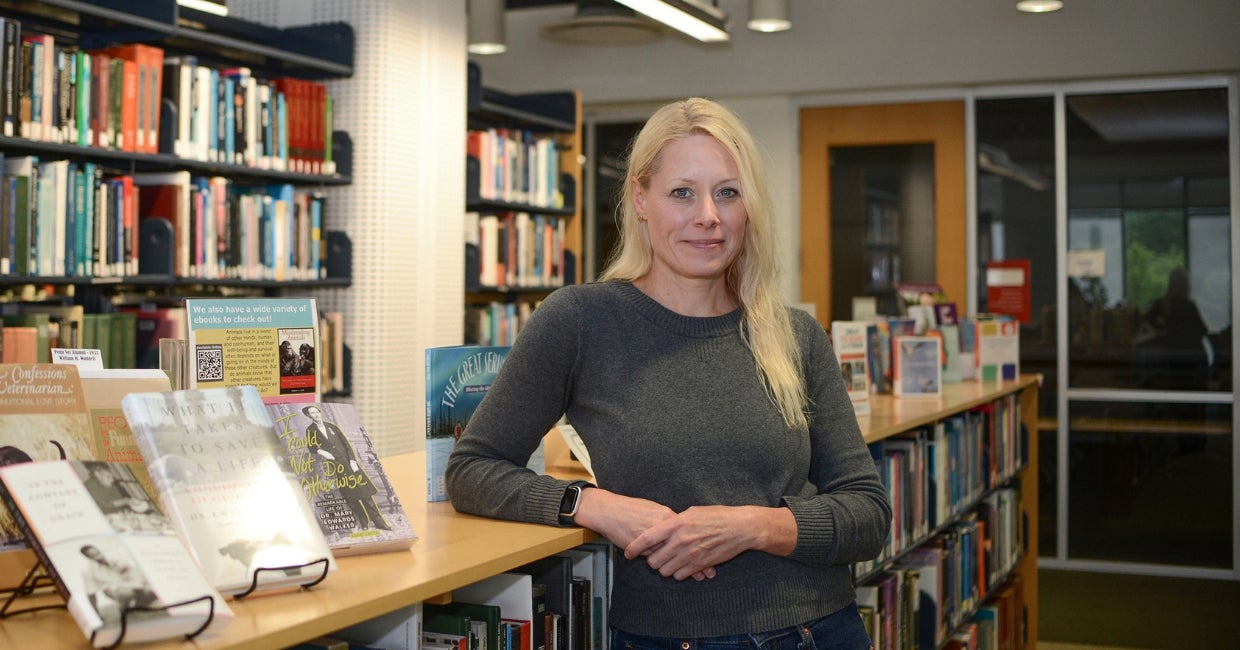The University of Pennsylvania School of Veterinary Medicine Names Amy Durham, Associate Dean for Education

Andrew M. Hoffman, DVM, DVSc, DACVIM, Gilbert S. Kahn Dean of the University of Pennsylvania’s (Penn) School of Veterinary Medicine (Penn Vet) has announced the appointment of Amy Durham, MS, VMD, MSEd, DACVP, as Associate Dean for Education. Durham who held the previous role of Assistant Dean for Education, succeeds Kathryn “Kathy” Michel, DVM, MS, MSEd, DACVIM (Nutrition) who successfully held the Associate Dean role for more than a decade. Michel began terminal sabbatical March of this year.
As Associate Dean, Durham will hold a pivotal leadership role, responsible for shaping, guiding, and advancing Penn Vet’s educational mission. Reporting to Andrew Hoffman, DVM, DVSc, DACVIM, the School’s Gilbert S. Kahn Dean of Veterinary Medicine, Durham will spearhead the continuous improvement of the integrated competency-based Veterinariae Medicinae Doctoris (VMD) curriculum that was launched in 2022. Working closely with faculty, she will lead development efforts in pedagogy and oversee academic policy development, maintain accreditation standards, and foster an outcomes-driven learning environment. Durham will also coordinate with Penn Vet’s Office of Admissions and Student Life to support student success and wellbeing.
“Dr. Durham is a well-respected veterinary pathologist and teacher with a demonstrated commitment to veterinary education and a record of excellence in academic leadership, curriculum design, and faculty engagement,” said Hoffman. “She, along with Dr. Kathy Michel, led our curricular redesign teams years before we launched our new curriculum. They spent countless hours re-engineering our student learning experience. Their focus, guidance, and hard work crafted a curriculum that will not only produce graduates who are highly knowledgeable in veterinary medicine, but well-rounded professionals who excel in communication, problem-solving, and ethical conduct. I am thrilled that Dr. Durham will continue to move our educational program forward and lead the strategic oversight of our curricular initiatives.”
Durham received her BA from the University of Virginia, her MS in Neuroscience from Georgetown University, her VMD from Penn Vet, and her MSEd in Medical Education from Penn’s Graduate School of Education. Following her three-year residency in Veterinary Anatomic Pathology at Penn Vet and successful board certification, Durham joined Penn Vet’s faculty as a Lecturer in the Department of Pathobiology in 2008, followed by promotion to Assistant Professor in 2010. In 2017, Durham was promoted to Associate Professor, and in 2022, she was promoted to Professor of Anatomic Pathology. She served as the first Chief Operations Officer of the American College of Veterinary Pathologists (ACVP) from 2018-2024, as well as chair or member of multiple ACVP committees and the editorial board of Veterinary Pathology. She is the author of over 75 peer-reviewed research papers and recipient of the 2015 Zoetis Distinguished Veterinary Teaching Award, the 2015 and 2023 American College of Veterinary Pathologists Presidential Awards, and the 2021 Lindback Award for Distinguished Teaching.
“I’m honored that I can continue to contribute to Penn Vet’s curricular initiatives at such a pivotal time for veterinary education,” said Durham. “I am committed to fostering a learning environment that is grounded in real-world relevance—one that supports both our students and our faculty. It is a privilege to work alongside such a dedicated community of academic colleagues, staff, and students as we shape the future of veterinary medicine.”
Related News

Behind the Breakthroughs: David Holt
In this edition, we sit down with small animal Professor of Surgery, David Holt, BVSc, DACVS. Dr. Holt is redefining how cancer is seen and removed during surgery. A Diplomate…

Annual Penn Vet Clinic Delivers Preventive Care to Hundreds of Philadelphia Pets
The Ryan Hospital at the University of Pennsylvania’s School of Veterinary Medicine (Penn Vet) hosted the 16th annual Dog and Cat Wellness and Vaccination Clinic on the Martin Luther King,…

At the 110th Pennsylvania Farm Show, Penn Vet and Agriculture Make For A Winning Partnership. And Don’t Forget the Milkshakes.
Just as Penn Vet has been a partner in Pennsylvania agriculture since its founding in 1884, the School has been an integral part of the Pennsylvania Farm Show. At this…
About Penn Vet
Ranked among the top ten veterinary schools worldwide, the University of Pennsylvania School of Veterinary Medicine (Penn Vet) is a global leader in veterinary education, research, and clinical care. Founded in 1884, Penn Vet is the first veterinary school developed in association with a medical school. The school is a proud member of the One Health initiative, linking human, animal, and environmental health.
Penn Vet serves a diverse population of animals at its two campuses, which include extensive diagnostic and research laboratories. Ryan Hospital in Philadelphia provides care for dogs, cats, and other domestic/companion animals, handling more than 30,000 patient visits a year. New Bolton Center, Penn Vet’s large-animal hospital on nearly 700 acres in rural Kennett Square, PA, cares for horses and livestock/farm animals. The hospital handles more than 6,300 patient visits a year, while our Field Services have gone out on more than 5,500 farm service calls, treating some 22,400 patients at local farms. In addition, New Bolton Center’s campus includes a swine center, working dairy, and poultry unit that provide valuable research for the agriculture industry.
